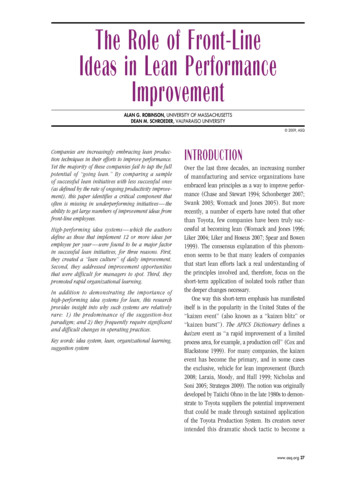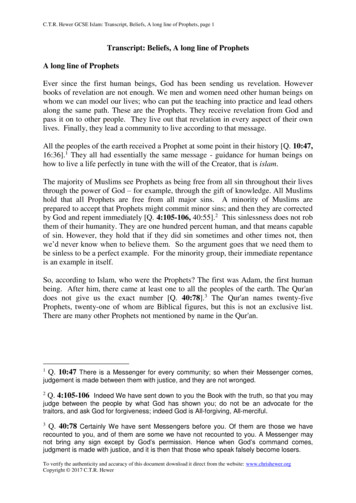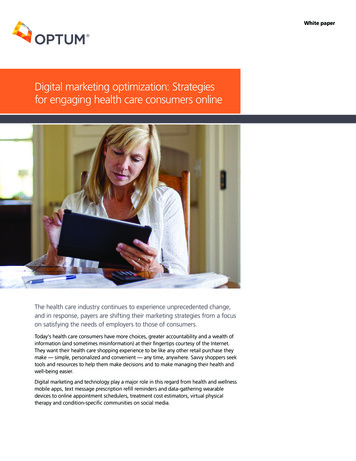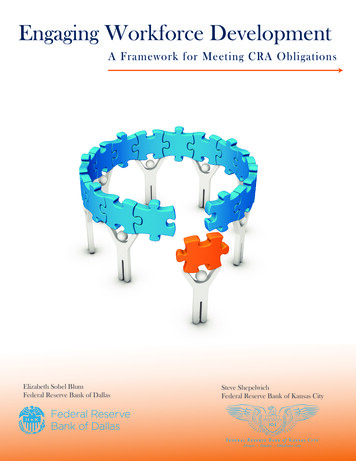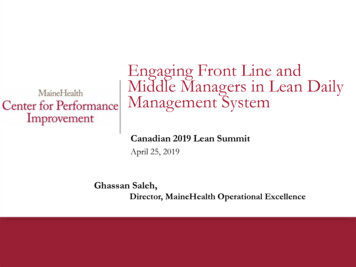
Transcription
Engaging Front Line andMiddle Managers in Lean DailyManagement SystemCanadian 2019 Lean SummitApril 25, 2019Ghassan Saleh,Director, MaineHealth Operational Excellence
MaineHealth Vision: “Working together so our communities are the healthiestin America”2
We are HospitalsPhysiciansNursesOutpatient care centersHome health agenciesOutpatient surgery centersDiagnostic centersAnd much more 3
Who We Are A not-for-profit, integrated healthcaresystem serving 11 Maine counties andone New Hampshire county Among the nation’s top 100 integratedhealthcare delivery networks Consists of 15 member organizationsand 5 affiliates – across 10 differentlocations in both Maine and NewHampshire Committed to supporting healthyindividuals and healthycommunities4
Our Journey to OpExAs of Sept 18, 2018 Every memberis onboard with OpEx last memberto join was WMHCOur Process- Leadership and Manager trainings- Establish OpEx lead at each organization- Huddle board design and pilot- Monthly 3 Day Unit Champion Trainings- Gemba walks begin- Ongoing training and coaching
Introduction to MaineHealthOperational Excellence6
Core Components of a Strong Management SystemDaily HuddleData Based Decision MakingGemba WalksImprovement Events7
Leadership 15min morning huddlemanagers and directors invited8
Core Components of a Strong Management SystemGemba Walks – Daily visits to the work units 1 hour standardized walks that lead top level managers to each unit of the organization Staff provide a report on improvement efforts as well as general operating status. Leaders provide staff with support, big picture views, and coaching5 Why’sAction PlanMARKERSS Q ERun ChartRun ChartRun ChartPareto ChartPareto ChartPareto Chart9
Focused Problem SolvingA systematic, data driven, visual approach identifies and solves key problemscausing below target performanceDaily KPILiving Pareto5 Why AnalysisAction PlanMissing TargetReasons whyRoot CauseActions to takeStandard problem solving methods lead to true root cause solutions resultingin improved and sustainable performance.10
Operational Excellence ModelStandard workfor LeadersProject Work andEducationDaily Management SystemImprovement EventsStandard workfront lineImprovement Support SystemWe love to call it our “Solar System”11
Challenges We Have Faced Manager EngagementPerception of Value (ROI and Public Relations)Strategic AlignmentSr. Leadership Development12
Manager Engagement13
Challenges in Engagement Model emphasis and training focused on “senior leaders” and “frontline.” “Middle” managers felt left out. Model had been perceived as requiring managers to be “hands-off.”Despite manager pre-trainings that emphasized a list of managers’ roles Some of the champions were too sensitive/afraid to include themanagers in OpEx work (developing new KPIs, data collection plans, oreven meetings).14
Action Plan A taskforce was developed to study the current state, drill the problem into it’s rootcauses and come up with solutions. The taskforce included a broad representation. While on the work, the taskforce gave updates to all system members through thesystem wide OpEx Workgroup The results are: Standard work for managers booklet. Standard work for managers training. Tools to help managers do a better jobdealing with day to day improvementchallenges.15
The Manual and The Training Covers four Domains1. Lean DailyManagement2. KPI BoardLogistics4. Coaching3. ManagerialSkills16
The Manual and The Training Covers four Domains1. Lean DailyManagement2. KPI BoardLogistics4. Coaching3. ManagerialSkills17
Lean Daily Management Standards were set for how the managers support lean dailymanagement system Minimum number of Gemba walks they should join ina week. Minimum number of times they should join the organizational huddle Tools and ideas on how to do it. E.g. No fly zone Tips on how to excel .e.g. support owndepartment KPI presentation, joining differentworks, and steal shamelessly18
Lean Daily Management Tips on the managers’ role in more complex KPIsA tool on how to deal with interdepartmental KPIs (Appendix A in thedocument) A set of flash cards that give specific tips on handling specificsituations (a later-on efforts but complimentary): How to choose a good KPI How to handle a big KPI Determining what to do next. Tips for data collection19
The Manual and The Training Covers four Domains1. Lean DailyManagement2. KPI BoardLogistics4. Coaching3. ManagerialSkills20
KPI Board Logistics A refresher for all the logistics that need to be followed through to keepthe machine oiled. Tools to make sure that all staff take part in presenting their KPI board(or at least in one of the OpEx activities). Calendars with names of whois going to present when. Managers to present their board if staff is tending an urgent patient care Tips on data collection plans, tools and examples were shared.21
The Manual and The Training Covers four Domains1. Lean DailyManagement2. KPI BoardLogistics4. Coaching3. ManagerialSkills22
Managerial SkillsA Suggestion to Establish a daily huddle with your staff.Why? Focus on today! Huddles are an opportunity to check-in with the team daily. It’sa chance to share what each team member is responsible for, determine barriersto customer/patient care, discuss safety concerns and share information Huddles help: improve communication align your team boost productivityLE ENDUD D EV TO improve moralHO A N NSTOW NICS ESTIO DLEHN ECH QU HUDOG S, T ON AMNIIN G TIP OMM A TEATR DIN F C INGO URUSLEINC MPL ED DAEX E ASKB23
Foster a Culture of Continuous Improvement Data-Based problem solvingRed is GoodFocus on process, not peopleBlame free environmentEmpower staff to solve department/organization problemsDon’t let perfect be the enemy of better24
Example
The Manual and The Training Covers four Domains1. Lean DailyManagement2. KPI BoardLogistics4. Coaching3. ManagerialSkills26
Managing as a Coach Coaches assess ALL aspects of their athlete. That includes currenthealth & wellness characteristics, fitness ability and life-style. Coaches provide direction and the plan. Coaches provide logical feedback to the athlete when needed. Coaches provide support when needed.O IESTW IVITOSH CTNNAIOO NTTSSPTI EME QUEGVTHIN PRO IGH HTCRACO TE IMTHE TAUGTA ING REILEI SKCWAF YAB27
Results of Standard Work for Managers Training Rave reviews for the training. Little changes on the Gemba walks. Improved knowledge of managers, but still very busy to act on their new knowledge.28
Fellowship Course Structure 4 sessions 4 weeks apartDepartment Self-AssessmentHomework ReviewContentEnergizerInteractive ActivitiesHomework AssignmentPeer-to-Peer DiscussionAdvisor29
Managers Fellowship What is Coaching? Choosing a good KPI When to call for action Prioritizing coaching opportunities Coaching flash cards Hoshin KanriThe need to focusMaineHealth strategic deploymentTools for strategic awareness andalignment The Balanced LEMSOLVING / Engagement ideas Report out on assignments Peer to Peer Discussion Hot Topics Panel DiscussionIMPROVEMENT TOOLS Why Problems StayUnsolved?Problem Identificationand Problem AnalysisSolution Prioritization andSelectionError Proofing and VisualManagement30
Perception of Value31
2017 Maine Quality Counts Improvement Leadership AwardThe QC Quality Improvement Leadership Award recognizesan individual or organization that has introduced innovations,used creativity, and embraced risk-taking in their leadership ofdemonstrably successful quality improvement initiatives.32
OpEx CelebrationAGENDA: Opening Remarks—Bill Caron Advocate Awards: Introduced by Jordan Peck Awards presented by Omar Hasan Group Photograph New OpEx Video KPI Team Awards: Introduced by Ghassan Saleh, AbigailAm, Joyce, Melissa Zelaya-Floyd Awards presented by OpEx Leads Closing Remarks—Omar Hasan Socializing33
OpEx Dashboard34
What is Gemba Watch!?Videos Short unscripted, unpolished videovignettes Everyday success stories Patient Experience- KPIs- Values Accessible Quick way to share information- MMP, Access to Care Process Change- FCHN, PT/OT Punch In, Punch Out- LincolnHealth Accounting35
Moving Forward36
Maturity ModelLEVEL 5LEVEL 4LEVEL 3LEVEL 2LEVEL 1Habit Forming: Theorganization is beginning toexplore operational excellenceand get in the habit of datacollection and problem solving.Managers: are feeling burdened withextra responsibility. are unsure of their place inthe process. help to encourage KPIselection but feel powerless. work to assign staff topresent at KPI boards. are concerned that someunit KPIs point the finger attheir unit for issues.Exploration: The organizationhas become comfortable withthe tools and goals ofoperational excellence andbegin to explore how to usethem to fit the organizationalneeds most effectively.Managers: continue to feel burdenedand are seeking to reducemeeting work load. are regular attendees at dailyactivities own issues identified byother units and share withtheir staff. are the face of their unit andcommunicate their KPIswith colleagues. Some are having greatersuccess than othersManagers have desire toown KPIs but hold back.Activation: The activities ofoperational excellence are nowhabitual in the organization.They begin to be used toreplace some activities that tookplace in the old cultureManagers: have shared best practicesbetween themselves. are emerging as leaders intheir unit rather than highperforming staff members. are actively engaging theirstaff to identify KPIs andfacilitate discussion.Building: The activities ofoperational excellence are fullyunderstood and being used asthe basis for integrating otherefforts and tools.Managers: gain great familiarity withimprovement methods andencourage use of tools fromstaff. use meetings to identifyhigh impact KPIs andpresent KPIs to their stafffor consideration. coach their staff throughproblem solving. are comfortable with staffidentifying and selectingKPIs. continue to gain a bigpicture view of theorganization by attendingdaily activities and use thisview to enrich activities intheir own unit. use no fly zone time toround on staff.Maturity: The organization fullyutilizes the elements of operationalexcellence. The tools and methodsbecome second nature.Managers Know that capability withimprovement is part of theassessment when promotingstaff to management rolls. are seen as experts and mentorsin improvement methods. facilitate staff discussion whichalready target high impactKPIs. coach their staff onimprovement methods. continue to gain a big pictureview of the organization byattending daily activities anduse this view to enrich activitiesin their own unit. use no fly zone time to dofocused rounding on staff. establish unit status boards thataddress the bigger picture,ongoing projects, as well as theKPI board.37
Hoshin Planning38
Standardized Training Portfolio39
THANK YOU40
Lean Daily Management Standards were set for how the managers support lean daily management system Minimum number of Gemba walks they should join in a week. Minimum number of times they sho

